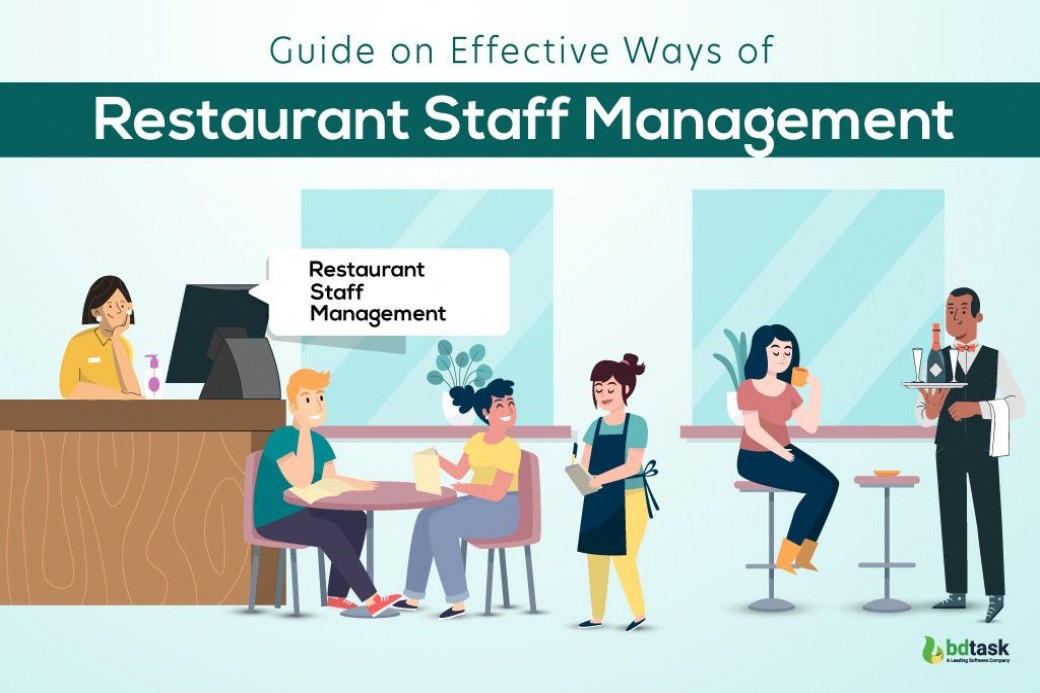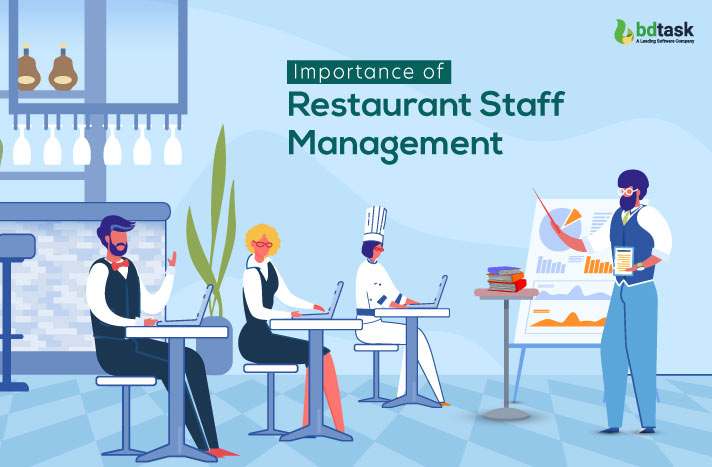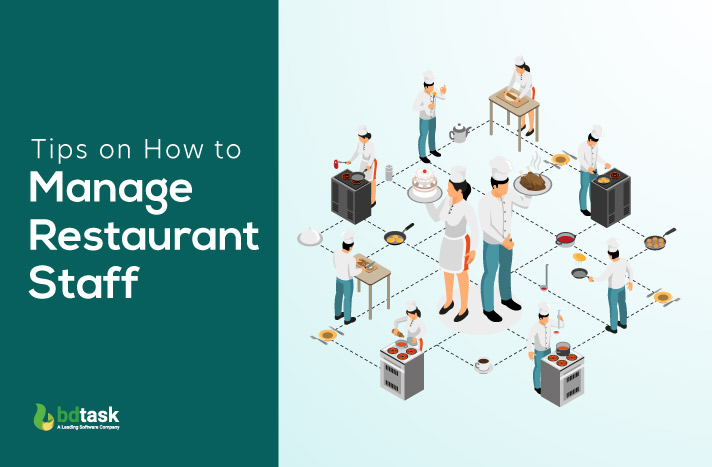Guide on Effective Ways of Restaurant Staff Management

Effective restaurant staff management is essential for businesses seeking to establish a positive reputation in the industry and deliver an excellent customer service experience. By aligning staff members with key goals, equipping them with the necessary skills and knowledge, and recognizing their talents and accomplishments, restaurant owners can ensure that their staff is motivated and performing to their full potential. Establishing a culture of appreciation and respect will also go a long way in helping restaurant staff stay well-managed and productive. Furthermore, creating a safe, inclusive working environment that celebrates diversity and encourages collaboration will help foster a culture of success.
Importance of Restaurant Staff Management

Effective restaurant staff management is the backbone of any successful restaurant. With the right team in place and the best practices to manage them, it can be easier for a business to achieve its goals. Business owners must be aware of the importance of having a proactive approach to staffing, including training and hiring restaurant employees with the right skillsets, having restaurant staff management software in place to monitor performance, and rewarding staff for their hard work. Effective restaurant staff management software is key to ensuring that all team members are working towards the same goals, leading to more efficiency and higher overall performance. However, the importance of restaurant staff management is discussed in brief below.
01. Decreased Turnover
Restaurant staff management is important because it reduces turnover. Reduction in turnover is one of restaurant management's objectives. You may lower training expenses and foster a sense of community by encouraging employees to stay in their roles by fostering a good and encouraging atmosphere.
02. Better Workplace Standard
Well-managed teams frequently experience less job-related stress and are better equipped to contribute to a positive environment. If your employees enjoy coming to work every day then half of your management stress is decreased. As they are already coming to work with a positive attitude.
03. Enhanced Morale
Employees are more willing to work hard and take pleasure in going to work when they feel appreciated and respected. So it is very important to appreciate your employees for their work as well as improvements. Also, approach them in a respected manner even when any staff does a mistake or fails to accomplish their job.
04. Increase Customer Satisfaction
Effective management may enhance employee satisfaction, which can result in greater customer care and service. Making sure your employees get the tools and training they require may help them do their tasks as effectively as possible. This is one of the major reasons restaurant staff management is important.
05. Dedicated and Effective Team
Teams that prioritize efficiency, set goals, and foster a feeling of community is more successful and motivated. Pushing your team to accomplish their targets is another importance of restaurant staff management.
06. Enhanced Effectiveness
Restaurant managers who effectively organize and assign tasks may frequently enhance operations, save expenses, and discover novel methods to achieve business targets. Restaurant staff management is important because you need to enhance effectiveness.
Tips on How to Manage Restaurant Staff

Effective restaurant staff management is essential for successful restaurant management. Having a clear chain of command and set of expectations for employees to follow helps create an organized and productive environment. Managers should be prepared to answer questions from staff, provide direction and mentorship, and handle any conflicts that arise. Training the team in customer service measures and proper sanitation techniques is also important.
01. Increase Management Skills
It may take some time and dedication to constant development to become a good leader. Be open to taking suggestions from your team from the start so you can determine which of your methods are effective and which require additional development. Recognize that transitions frequently take time and that during your first few weeks and months as a new boss, you must learn a lot. Utilize this opportunity to practice the skills that will help you lead your team more successfully. You should practice developing some skills to become a better leader which are given below:
-
Communication
An essential ability for a restaurant manager is communication. You can create clear expectations, handle performance issues, and transmit information to your employees more quickly and effectively if you know how to speak to them.
-
Leadership
Your ability to lead others will enable you to establish an atmosphere of respect and trust. Teams that trust you as a leader are more likely to pay attention to your instructions and put more effort into receiving your approval.
-
Patience
It might take time and patience to build strong connections with your team members. Recognize that creating a sense of community and trust takes time. While you evaluate which management techniques are most beneficial for you and your team, exercise patience with new employees and new partnerships.
-
Time Management
Time management in restaurant business is another ability a restaurant manager should focus on. Your teams can operate easily and effectively if you know how many employees you'll need for each shift, how to organize your teams, and when to give them breaks. Time management is one of the best practices in restaurant operations.
-
Flexibility
Things may change rapidly in the restaurant industry. So you have to be very flexible. Making plans for the unexpected might help you manage problems and react to new circumstances and incidents.
-
Organization
Restaurant managers must have the ability to organize their time effectively. Keeping track of timetables, inventory requirements, employee demands, and goals of the business might need smart planning and trustworthy organizational approaches.
02. Seek Assistance
If you're starting a new career, you may need to get assistance from the staff in the restaurant for understanding the restaurant's opening and closing protocols, technical expertise such as how to operate the POS system, or where they purchase supplies.
Asking for assistance and being patient when you study how to perform in a new position will not decrease your staff's respect for you. It just reflects that you are concerned about the profession and perform well. Once you understand how to do the activities which are essential to managing the eatery, you can better lead your employees and support employees when they're short-staffed or stressed.
03. Become Proactive
Things may move rapidly in the restaurant sector. Being proactive will help you anticipate problems before they occur. When making major leadership choices, aim to think about the future instead of merely the present time or scenario.
04. Prepare Your Team
Always ensure that your staff is well-prepared for success. This will indicate to your employees that you care about their well-being and are watching out for them. Make sure your workforce is sufficient to handle your peak season of day and year. If someone does not show up, the rest of the team is not put under pressure to perform more than they are capable of doing.
You may also assure your employees that they have all they need. Ensure your inventory can meet the needs of every single day, ensure employees know where they're performing and understand or knows their workplace better, also ensure that everyone realizes your standards and that you're putting the entire team to similar standards. Fairness can strengthen your employees' regard for you.
05. Develop a Sense of Community
Developing a feeling of unity and team spirit among your restaurant employees is one of the finest things you can do. People are more willing to do whatever it takes to achieve group objectives when they feel like they are a member of a clan or group. By fostering conditions of mutual respect and trust, you may foster a feeling of community. Open channels of communication should be established, and living environments that allow team members to be themselves should be encouraged.
If you're in the position of hiring restaurant staff, search for potential teammates who get along well with your current staff. Training skills might be simpler than training culture. But be mindful to not let the warm or familial culture encroach on your own limits. You can be polite with your employees without lowering your standards. To keep your teams motivated and content, be steady and promote unity and respect.
06. Establish Target and Aim
Consider establishing targets for both you and your team. The targets you create for yourself might assist you in prioritizing your values and developing your management abilities. Your team may experience the same thing. Clear expectations and targets can help people focus and promote a sense of achievement when they are attained. Maintain the standards you have established for your teams. In order to generate something to work for and foster a feeling of shared purpose, you might arrange team meetings to talk about your team's individual and professional objectives.
07. Create Boundaries
Although creating a feeling of community among your workers is necessary, be sure to create strong restrictions. If your restaurant raised you internally to a managerial position, this may be very significant. When you worked with other employees, you could have formed connections with them. These connections don't have to end because you're a manager, but you may need to express your limits and expectations for your new position.
Giving yourself the time you require to rest and taking good care of yourself is also essential. Being in charge of a restaurant may be challenging, so by taking short breaks, you can better support both yourself and your team in doing their jobs properly.
08. Always Be Approachable
Being approachable to your workers is one of the finest things you can do to help them. Giving instructions, considering recommendations, and paying attention to comments may make your teams feel appreciated. Being available also indicates that you are prepared to assist others when necessary. Even if you might have important responsibilities in your new position, it might increase motivation among your team to see you carrying out tasks that aren't particularly management-related. Being supportive when it's required will boost your team's enthusiasm for you and improve your capacity to maintain a collaborative and effective atmosphere.
09. Express Your Appreciation
Make an effort to express your gratitude to your employees. Congratulate employees for exceeding expectations, accomplishing goals, and enhancing their abilities. There are several methods to communicate your thanks to your employees, including honoring an employee of the month, granting increases, vocally expressing your gratitude, throwing events or parties, and writing individual thank you cards.
Regardless of how you decide to thank your staff for their efforts, the gesture may make them feel recognized, cared for, and cherished, which can minimize waste, increase morale, and encourage them to continue their wonderful job.
10. Train Your Employees
When hiring restaurant staff, make sure they understand the restaurant's standards and culture. Give them the assistance they require to do their work properly and blend in with the crew. The ultimate objective of every restaurant is to create the greatest eating experience possible for its customers. While successful team management may make life easier for your employees, it must also convert into a better customer experience. One method to achieve this is to train staff for diverse circumstances.
For example, if a client orders a customized menu item or inquires about preparation because they have dietary restrictions, ensure that your staff is trained to answer queries and meet requests. Similarly, have a plan in place for dealing with displeased or unhappy consumers. The more situations you train your employees for, the more they will have positive experiences with consumers and professionally represent your company.
11. Share Your Credit
Acknowledging the part your team contributes to achieving company objectives can help your team. When a restaurant owner congratulates you on a successful mission, be sure to include all the people who worked behind the scenes to make it happen. Give credit where credit is due and refuse to claim credit for something that was a team effort. Giving each other credit may show your team how much you appreciate their efforts and support. And it also indicates how much you all care about each other's success.
12. Constantly Look to Improve
Even if you are happy and satisfied with yourself and your crew's performance, attempt to discover areas where you can improve. It might just apply to personal changes, like expanding your talents as a manager. But it can also apply to your operations and enhance the efficiency of your business. Try asking your teams for suggestions on areas where you can improve. They could offer important statements regarding restaurant operations that might help your entire workforce and the business.
Conclusion
Restaurant staff management is a complex process that requires careful consideration and planning. To maximize efficiency and customer satisfaction, restaurants must take into consideration the diverse needs of their staff. Restaurant managers must develop an effective strategy for managing their staff, including training, motivation, and communication. Additionally, a comprehensive restaurant staff management software for documenting staff performance should be established to ensure that all employees are held accountable for their work.










